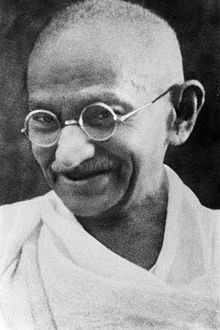Born and raised in a Hindu merchant caste family in coastal Gujarat, western India, and trained in law at the Inner Temple, London, Gandhi first employed nonviolent civil disobedience as an expatriate lawyer in South Africa, in the resident Indian community's struggle for civil rights. After his return to India in 1915, he set about organising peasants, farmers, and urban labourers to protest against excessive land-tax and discrimination. Assuming leadership of the Indian National Congress in 1921, Gandhi led nationwide campaigns for various social causes and for achieving Swaraj or self-rule.
Gandhi famously led Indians in challenging the British-imposed salt tax with the 400 km (250 mi) Dandi Salt March in 1930, and later in calling for the British to Quit India in 1942. He was imprisoned for many years, upon many occasions, in both South Africa and India. He lived modestly in a self-sufficient residential community and wore the traditional Indian dhoti and shawl, woven with yarn hand-spun on a charkha. He ate simple vegetarian food, and also undertook long fasts as a means of both self-purification and political protest.
Gandhi's vision of an independent India based on religious pluralism, however, was challenged in the early 1940s by a new Muslim nationalism which was demanding a separate Muslim homeland carved out of India.[10] Eventually, in August 1947, Britain granted independence, but the British Indian Empire[10] was partitioned into two dominions, a Hindu-majority India and Muslim-majority Pakistan.[11] As many displaced Hindus, Muslims, and Sikhs made their way to their new lands, religious violence broke out, especially in the Punjab and Bengal. Eschewing the official celebration of independence in Delhi, Gandhi visited the affected areas, attempting to provide solace. In the months following, he undertook several fasts unto death to stop religious violence. The last of these, undertaken on 12 January 1948 when he was 78,[12] also had the indirect goal of pressuring India to pay out some cash assets owed to Pakistan.[12] Some Indians thought Gandhi was too accommodating.[12][13] Among them was Nathuram Godse, a Hindu nationalist, who assassinated Gandhi on 30 January 1948 by firing three bullets into his chest.[13]
Native name મોહનદાસ કરમચંદ ગાંધી
Born Mohandas Karamchand Gandhi
2 October 1869
Porbandar, Porbandar State, Kathiawar Agency, Bombay Presidency, British India[1]
(present-day Gujarat, India)
Died 30 January 1948 (aged 78)
New Delhi, Delhi, Dominion of India (present-day India)
Cause of death Assassination
Resting place Raj Ghat, Delhi, India
Nationality Indian
Other names Mahatma Gandhi, Bapu ji, Gandhi ji
Alma mater University College London[2]
Inner Temple
Occupation
Lawyer Politician Activist Writer
Known for Indian Independence Movement,
Peace movement
Political party Indian National Congress
Movement Indian independence movement
Spouse(s) Kasturba Gandhi (m. 1883; d. 1944)
Children
Harilal Manilal Ramdas Devdas
Parents
Karamchand Gandhi (father)
Putlibai Gandhi (mother)
Signature
Mohandas K. Gandhi signature.svg
At age 9, Gandhi entered the local school in Rajkot, near his home. There he studied the rudiments of arithmetic, history, the Gujarati language and geography.[34] At age 11, he joined the High School in Rajkot.[36] He was an average student, won some prizes, but was a shy and tongue tied student, with no interest in games; his only companions were books and school lessons.[37]
While at high school, Gandhi's elder brother introduced him to a Muslim friend named Sheikh Mehtab. Mehtab was older in age, taller and encouraged the strictly vegetarian boy to eat meat to gain height. He also took Mohandas to a brothel one day, though Mohandas "was struck blind and dumb in this den of vice," rebuffed the prostitutes' advances and was promptly sent out of the brothel. The experience caused Mohandas mental anguish, and he abandoned the company of Mehtab.[38
Hi! I am a robot. I just upvoted you! I found similar content that readers might be interested in:
https://www.youtube.com/watch?v=hoMB4Zs20BIDownvoting a post can decrease pending rewards and make it less visible. Common reasons:
Submit